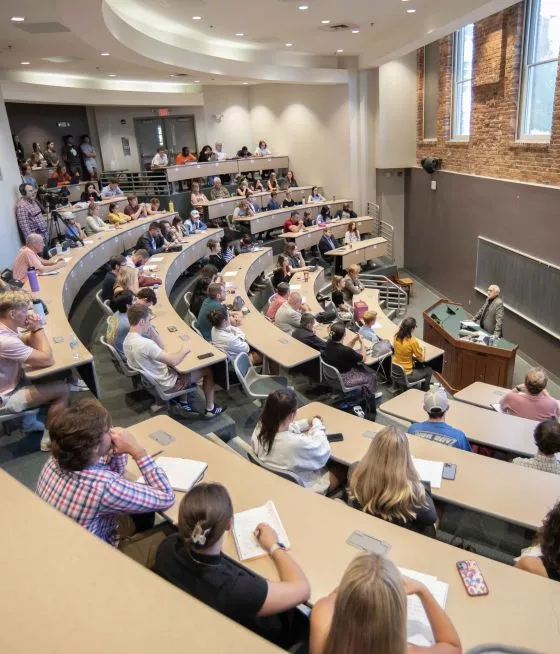
JMC
Constitution Day Events
Every year, Constitution Day commemorates the signing of the U.S. Constitution on September 17, 1787. Jack Miller Center’s Constitution Day Initiative leverages this congressionally-sanctioned national holiday to enhance constitutional literacy through campus lectures, public events, and popular media.
Events around the country
This year, various campuses and institutions will conduct programming in an effort to enhance the civic education of American students. These programs are often conducted or supported by members of the Jack Miller Center Scholarly Network.
In 2023, 43 campuses and institutions nationwide partnered with the JMC to conduct Constitution Day events for students and the public. This day engages students in conversations about the role and meaning of the Constitution in American political life.
“All this is not the result of accident. It has a philosophical cause. Without the Constitution and the Union, we could not have attained the result; but even these, are not the primary cause of our great prosperity. There is something back of these, entwining itself more closely about the human heart. That something, is the principle of “Liberty to all” — the principle that clears the path for all — gives hope to all — and, by consequence, enterprize, and industry to all.”
Abraham Lincoln
Explore JMC-supported 2024 Constitution Day events below:
- September 9, Skidmore College: “A Tale of Two Liberalisms: Desegregating American Political Thought” with JMC Scholar Susan McWilliams Barndt
- September 11, Saint Vincent College: “Constitutional Reset: SCOTUS’s Renewed Separation of Powers” with Adam Carrington
- September 13, Lee University: “14th Annual Constitution Day Quiz Bowl and Lecture“
- September 13, University of Missouri: “The Constitution and America’s New Racial Battle Lines” with Rogers Smith
- September 16, North Greenville University: “What Can George Washington Teach Us About the Constitution” with William Reddinger
- September 16, Princeton University: “Government Corruption and Private Power” with Julia Mahoney
- September 16, Villanova University: “How the Pursuit of Happiness Defines America” with Jeffrey Rosen
- September 16-19, Rose State College: “Constitution Extravaganza” featuring Jack Rakove
- September 17, Assumption University: “Is America a Creedal Nation? A Jewish Perspective” with David P. Goldman
- September 17, Benedictine College: “President Kennedy’s Interpretation of the First Amendment” with Ryan T. Anderson
- September 17, Biola University: “Natural Rights, Virtue, and the Constitution” with Mark Blitz
- September 17, Catholic University of America: “Freedom from Religion or Freedom for Religion: Natural Rights & the American Constitution” with Vincent Phillip Muñoz
- September 17, Claremont McKenna College: “History v. Originalism” with Jonathan Gienapp
- September 17, Michigan State University: “Disinformation, Demagoguery, and the First Amendment” with Charles Zug
- September 17, St. Ambrose University: “New York Times v. Sullivan and the Original Meaning of the First Amendment: Rethinking Libel and Freedom of Press” with JMC Scholar Carson Holloway
- September 17, Texas State University: “The Forgotten Role of Republican Virtue in the American Constitution” with Benjamin Kleinerman
- September 17, Towson University: “Our Beliefs in/and the Constitution—Freedom of Religion, Then and Now” with Matthew Taylor and Ioanna Tourkochoriti
- September 17, University of South Carolina: “Adam Smith and Founding Economics: The Political Economy of the U.S. Constitution” with Samuel Gregg
- September 18, Great Hearts Institute: “The Constitution: Hidden Truths and Enduring Myths” with Miller Fellow Andrew Porwancher
- September 18, University if Nevada – Las Vegas: “Native Nations and Jefferson’s 1804 Constitution” with JMC Academic Council Member Jeremy Bailey
- September 18, West Virginia University: “The Constitution and Human Flourishing” with Samuel Gregg
- September 19, Cairn University: “Roger Sherman and the Creation of the American Republic” with Miller Fellow Mark David Hall
- September 19, University of Wisconsin – Madison: “The Spirit of Amity: The Constitution’s Forgotten Cover Letter and the Original Meaning of Civility” with Derek Webb
- September 20, Christendom College: “The Post-Constitutional Temptation” with JMC Scholar James Stoner Jr.
- September 20, Providence College: “Why September 17 Matters and What All Americans Should Know about Our Constitution” with Jerome Foss
- September 20, University of Georgia: “Of Kings and Presidents: Monarchy and the Framing of the Constitution” with Eric Nelson
- September 20, University of Houston: “State, Constitution, and the Death of Politics” with Jacob Howland
- September 20, Utah Valley University: “James Madison as the Founder of Founding” with James Ceaser
- September 23, Ursinus College: “James Baldwin, History, Responsibility, and Atonement” with Melvin Rogers
- September 24, Louisiana State University: “Government Corruption and Private Power” with Julia D. Mahoney
- Sepember 26, University of Toldeo: “Freedom from Religion or Freedom for Religion? Religious Liberty & American Constitutionalism” with Vincent Phillip Muñoz
- September 27, Jacksonville State University: “Constitutional Interpretation & Civic Leadership in Polarized Times” with Drew Kurlowski and Kimberly Hurd Hale
- October 7, American University: “Can the Constitution Unify Americans?” with Yuval Levin
- October 10, SUNY-Geneseo: “A Defense of American Constitutionalism” with Marc Landy
Additional campuses hosting JMC affiliated Constitution Day 2024 events
- Bellarmine University
- Boston College
- Christopher Newport University
- Faulkner University
- Oglethorpe University
- Pomona College
- Regent University
- Rhodes College
- University of Tennessee at Chattanooga
